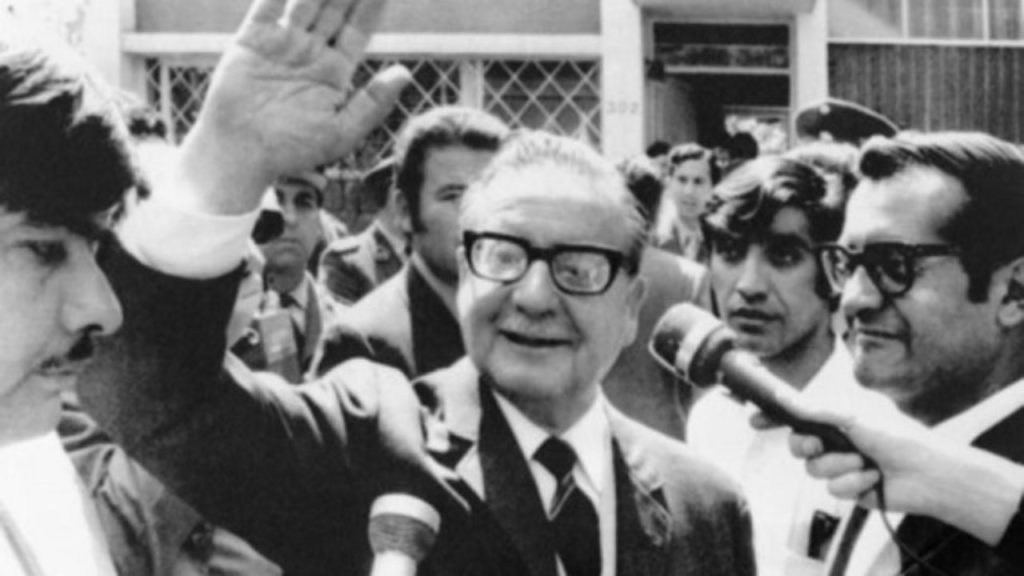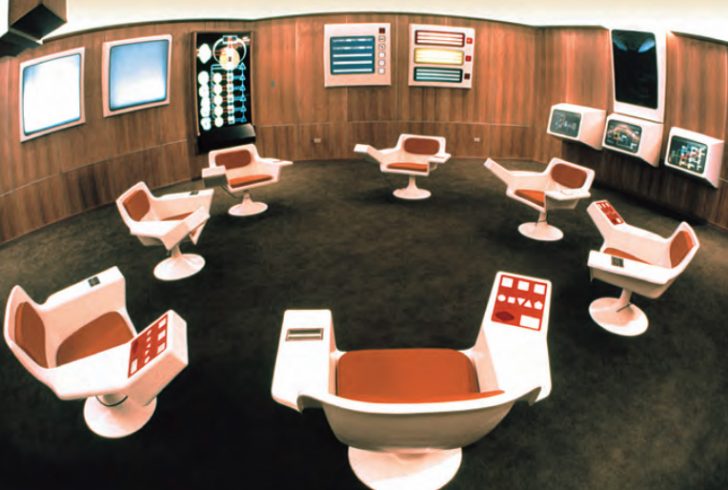
The “peaceful road to socialism“, is a term used to describe almost exclusively the government of Salvador Allende in Chile, which lasted between November 1970 to September 1973. Allende’s government undertook a wide set of initiatives intended to redistribute wealth across the country, and make Chile more economically self-sufficient. But these set of policies earned the ire of sections of the Chilean middle-class and especially the Chilean right, as well as drawing the attention of the United States – who immediately set about working to destroy it. The “peaceful road to socialism” is often used pejoratively by those critical of the stance that socialism can be achieved through parliamentary means, and the eventual collapse of Allende’s government in three underscores that, but it is also used by those sympathetic to the legacy of Allende’s struggle for social and economic justice. A more neutral term is “the Chilean road to socialism”.
On 5 September 1970, Salvador Allende, who represented the Socialist Party and Unidad Popular (Popular Unity), a coalition party of various groupings running the gamut from centre-left to far-left, won the 1970 presidential election. Allende became the very first Marxist brought to power through liberal democracy – undermining the notion that if socialism were brought via ballot box, it would lose. However, the US – which tells the world that it doesn’t deal with the democracies of other countries, had serious concerns.
The Allende government did not simply have importance in the context of Chilean political history – particularly the history of working-class struggles and the legacy of the “Socialist Republic of Chile” of 1932 which lasted a mere 100 days, or simply the context of Latin American governments adopting dirigisme policies – The “peaceful road to socialism” is also to be understood in the context of the latter half of the Cold War that it existed in. There is of course, the descent into (or in some cases, the installation of) military dictatorships that would arise between the 1970s and 1980s, and of importance were a set of high instability for both the capitalist and socialist worlds. In the latter case, the Sino-Soviet split had not only led to severe tensions in Soviet-China relations (to the point of border skirmishes, and the threat of open conflict), it had forced socialist states to side with one power over the other, and risk the antagonism of the opposing nation. Even so-called “non-aligned” countries had to gamble whether on what power they wished to maintain relations with. In the case of Chile, it chose to favour the Soviet Union, with the possibility of positive relations with Cuba also influencing this stance (altough the latter as well as Chile would make steps to normalizing relations with China). Even so, even the Western Communist Parties – which held a pro-Soviet stance, would eventually break from this as a result of the Warsaw Pact invasion of Czechoslovakia in 1968, adopting what was called “Eurocommunism” – rejecting Marxist-Leninist vanguardism for seeking legitimacy through a parliamentary framework. Meanwhile, capitalism was also not without its crises: in response to the global economic slump, and the failure both of Keynesian-inspired methods to reverse inflation and of the currency devaluation of a numbers of Western nations (West Germany & UK), President Richard Nixon suspended the convertability of the US dollar into gold – which would later turn out to be permanent: The “Nixon shock” had smashed the ‘gold standard’, leaving the dollar – the international reserve currency, a ‘floating currency’: it had nothing backing it at all to stabilise prices.
The UP coalition were well aware of these global problems, and Allende referred to his politics as representative of a “third way” between capitalism and communism – now both in crisis. Socialists, revolutionary and reformist – watched with great interest on how this program would play out. The UP adopted a ‘developmentalist’ set of policies intended for economic redistribution, social welfare, and control of its own resources. One course of action, signifying the seriousness of its nationalisation projects as well its anti-imperialist defiance, was Allende’s decision to nationalise the copper mines without any compensation to the foreign companies in control of it, particularly ITT & PepsiCo.
The developments in Chile received the massive support of Chile’s working class and indigenous populations. However, capital – both domestic and foreign, were not pleased, and the Chilean right – who held substantial power in the Constituent Assembly and penetrated the armed forces. There were murmurs between them that Chile had succumbed to communism, and this demanded a nationalist struggle. The US was also happy to help: the advice Nixon gave to the State Department was to “make the economy [of Chile] scream”. Everything from strikes (from landowners, capitalists, and notably the wives of various military personnel), ‘lawfare’, assassinations, and coup attempts were set up and enacted to cause disruption and chaos.
In the perspective of revolutionary socialists who criticised Allende for class-collaborationism, these scenarios were the inevitable response to social democracy in Latin America, and the building of socialism required a firmer approach than parliamentarianism. However, the Chilean road to socialism was not merely a path of nationalised indutries, and considerable thought and planning was dedicated towards the transition from capitalism to socialism with the use of newly emergent systems planning.

In 1971, economists within the Allende government sought the assistance of the British cybernetician Stafford Beer to apply his theories to Chile’s economic development. Beer would meet with Allende in November 1971 to explain the cybernetic models that was to be applied to economic management. Allende understood very well what Beer was proposing, and called for the system to encourage worker participation, to be decentralised, and anti-bureaucratic. The project would acquire the name, “Synco” among the Spanish-speaking peoples of Chile, but in English it was called “Project Cybersyn”. Cybersyn was supposed to network all of the firms in nationalised scetor of the economy, link them to a central computer in Santiago, and provide a measure of the status of production, and give real-time responses to economic crises. It had only been used once to respond to a truck driver strike ostensibly motivated by the massive shortage of goods in 1973, but organised by various private industrialists to prevent the distribution of these goods; leading to the mobilisation of 200 truck drivers to distribute goods into the cities. Cybersyn was, even in its prototype stages, declared a success. However, the 1973 coup ushering in Pinochet regime would put an end to the project – its full potential never realised.
When tensions emerged between one of the parties which formed UP – the Movement of the Revolutionary Left (MIR) with the Allende government over the pace of socialist transition, Allende himself was forced to respond to the attempts to restrict his executive power from the right, by enacting policies by plebiscite. Unfortunately, whatever the pace Allende moved, his enemies moved faster. The Chilean congress had passed a motion accusing Allende of violating the Chilean constitution and of various abuses of power, which allowed for the Chilean armed forces to take action. It was the signal to the coup in motion, and the beginning of the end of the Allende presidency.
The end and aftermath of the journey to socialism

By 1973, two coup attempts had been made on Allende. By September 11 of the same year, the third time was marked by its success. Tanks entered the capital, and figher planes flew over the presidential palace, shelling it. The putschists in the Chilean military demanded that Allende surrender, while the members of the Socialist Party plotted their escape asked that Allende join them so that they could launch a counter-coup in a future time. Allende refused both options. In what would be Allende’s final speech to the Chilean people, broadcasted by radio, he declared that the putschists in the Chilean armed forces had betrayed the oath that they were sworn to protect, that he would defend the constitution to his dying breath and that as dark as the days events were, brighter days will return to Chile. Allende was dead by 2pm. The Chilean military arrested everyone, including their own who showed loyalty to Allende and refused to side with the coup. People who were associated with the political left, or suspected of left-wing sympathies were rounded up, beaten, tortured and killed. The “peaceful road to socialism” was over. What Chile went towards was the road to fascism and the bloody path to neoliberalism. The Chilean coup was a prelude to a period of political repression which saw the deaths and disappearances of 3,000 people over 17 years in Chile, and a wider campaign of ani-communism called Operation Condor, installing right-wing or military dictatorships across Latin America, leading to the deaths of 60,000 people – half of which from Argentina. Chile would return to liberal democracy in 1990.
Legacy
The collapse of the “peaceful road to socialism” had brought international discussions among the Left globally on its successes and failures. For the revolutionary left, it represented an ultimately naive (if promising) and tragic attempt to acheive a society beyond capitalism without class struggle, and treating the state apparatus as a neutral tool, rather than a weapon of class suppression. Even among the New Left intellectuals, notably Ralph Miliband, commented on the moderacy displayed by the Allende government in its programs (while also commenting on the somewhat celebatory responses found in the press of his country, even from so-called “democratic socialists”) and reemphasized the neccessity of class struggle.
For democratic socialists, particularly those committed to the expansion of democracy via a constitutionalist framework (and certainly ones more internationalist than the chauvinistic types Miliband referred to), there is an emphasis not on Allende’s failures, but on his steadfast courage and principled commitment to his politics, in all of its complexity. Of particular inspiration is the pursuit of the “peaceful road” up until its final moments – of particular symbolism is the manner of Allende’s death by gunshot. The rifle from Fidel Castro was offered to Allende to signify Cuba’s solidarity with the Chilean path, which Allende declared would be peaceful. Given the choice to seize power, or even to defend himself, the risk of other people being harmed, or his principles violated was not one he was willing to take, and so Allende’s rifle took the life of one person in his entire struggle: himself.
In both opposing perspectives, Salvador Allende occupies the role of a martyr of socialism – all the more significant in the afttermath of the Cold War, and in the Chilean left – he occupies a position close towards beatification, if not outright apeotheotic.
The 2021 election of the leftist Gabriel Boric, has little resemblance to the context in which Allende was brought to office. Organisations such as the Progressive International, and the movement of the “Pink tide” within Latin America, are circumstances created in the shadow of a post-Cold War climate which the Left is only started to step out of. But the legacy, iconography and continued relevance of the tragedy that beset the Chilean people, with the fall of Allende’s government, continues to drive Chilean politics. Even now, even if his laws have been overturned, the deep privatisation of Chilean economy installed by Pinochet is something that Chile has not yet overcome – and it remains an open question as to whether it eventually can even through the parliamentary means. A ‘peaceful road’ so to speak.
See also:
- Salvador Allende
- The other 9/11
- Democratic socialism
- “socialism with a human face”
- Reform vs revolution
- 2021 Chilean general election


